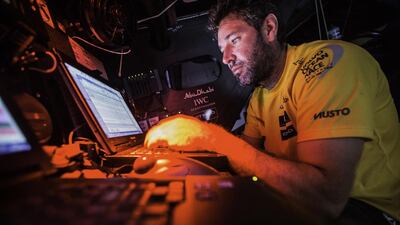Think of the great rock bands. Think of even the ordinary ones. The guy we celebrate the least is usually the bass player, right?
He is the one forever overshadowed, happy to emit a kind of mumbling, low-key and easy-to-miss cool about him.
And yet the bass players are the ones who underpin the entire edifice of sound, the ones on whose rhythm the music is the built, to whose beat the others work. Without them it might all fall apart.
On a boat of eight super-fit, super-motivated sailing crew, tasked to sail around the world in nine months, that guy is the navigator. Without him, the boats go (almost) nowhere.
In this year’s Volvo Ocean Race (VOR), where all boats are the same and there is little between the collective fitness of the crews, the spotlight more than ever is on the navigator; in recognition, one of the sponsors of the race is running a blog which offers a prize to the best navigator of each leg of the race.
Eventually, when the VOR docks and ends in Sweden next June, it may come to be known by the actions and decision of its navigators.
It was put to Simon Fisher, the navigator for Abu Dhabi Ocean Racing’s Azzam, that the pressure must be greater, given the suddenly enhanced profile of his breed. He laughed in response first. He laughs often and does it infectiously.
“Yeah, I try to ignore that. I guess it should [be more pressure], but I ignore it. If the lads sail faster it makes it easier for the navigator. We’re lucky we have a good team, some very good sailors.
“I think our boat handling is probably one of the best in the fleet and we’re probably one of the quickest boats, so that makes my life easier.”
Self-deprecation is another Fisher trademark. When he clarified the origins of his nickname, SiFi, it was done almost as stand-up comedy. (Long, less-funny story short: SiFi was what his mother called him when he was a child and is not a reference to his technological and electronic wizardry.)
But be under no illusion: the navigator is the architect of legs, the man tasked to play poker – or chess – with the seas, stars and the skies.
Ian Walker, the Azzam skipper, credited Fisher for “controlling” the in-port race in Cape Town on Saturday, which the Abu Dhabi team led from start to end.
And victory in the first leg, from Alicante to Cape Town, was based on many factors but none more than a couple of key moves instigated by Fisher.
“Certainly, it’s an important part of the race and you could argue it’s even more now because of the one-design,” he said.
“The speed differences are so small between the boats that it hinges on making the right decision, going the right way. Decision-making is elevated in its importance.
“It is a bit like chess, with the weather and other boats. When we’re offshore you get an updated position of the race every six hours; every six hours you see how well you’ve done. And it helps you plot your next moves. It’s a very tactical game.”
The decisive moment in the first leg – the big, bold call, as Fisher reluctantly concedes – was going to the west of the Cape Verde Islands instead of through them.
Strictly speaking, it was not bold, because that has been the traditional racing approach to those islands. Others, such as Team Dongfeng, actually gambled by going through.
But it was a risk and, though it resulted in a drop in positions, initially, it ultimately paid off, especially in setting up Azzam to go through the doldrums, an area near the equator where many a vessel has been becalmed for days or weeks.
In the navigational competition within the competition of this VOR, the decision and route were considered safe and conventional; Dongfeng’s Pascal Bidegorry, for instance, has been lauded as a far more radical decision-maker. “You can see the difference in people’s styles,” Fisher said.
“Some people chase the weather and it’s win or lose. And then there’s those that sail who try to make sure they consistently get a good result and stay at the front end of the fleet.
“At this stage, I would put myself in the conservative camp. We’ve got a fast boat, we feel we’re one of the better-prepared teams, so our goals at the moment are to be consistent and just keep getting the good results. Come later, there might be times when you need to say, ‘right, we have to win this leg’, and you put it all on red or black.”
Most of those decisions will be made on the boat itself, in real-time, with respect to the weather and position of the fleet. The key, however, is to be prepared for each potential outcome, so that the pre-leg strategising with the onshore team assumes deep importance.
In Marcel Van Triest and Chris Bedford, Fisher has two of the best strategic minds.
“In all our prep, we talk through all the possible situations and key points of the leg so when it comes to decision time, you have spoken about it before and it’s not like, ‘This is new, how do we deal with this?’
“You are, like, ‘If we do this, then this is the potential outcome; these are the risks and rewards’.”
osamiuddin@thenational.ae
Follow us on Twitter at SprtNationalUAE

